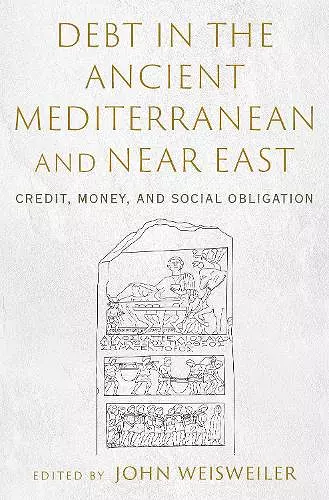Debt in the Ancient Mediterranean and Near East
Credit, Money, and Social Obligation
Format:Hardback
Publisher:Oxford University Press Inc
Published:22nd Dec '22
Should be back in stock very soon

In his Debt: The First 5000 Years, the anthropologist David Graeber put forward a new grand narrative of world history. From the Late Bronze Age onwards, all across the Near East and Mediterranean, relationships of mutual obligation were transformed into quantifiable and legally enforceable debts. Graeber suggests that this transformation made possible new economic institutions, such as IOUs, coinage, and chattel slavery. It also led to the emergence of modes of thought that have shaped Eurasian philosophical and religious traditions ever since. Debt in the Ancient Mediterranean and the Near East explores the implications of this theory for the history of the Mediterranean and Near East. A distinguished group of ancient historians assesses how well Graeber's interpretations fit current understandings of ancient and late antique economies. At the same time, this volume offers a history of premodern credit systems which takes seriously the dual nature of debt as both quantifiable economic reality and immeasurable social obligation. By exploring the diverse ways in which social relationships were quantified in different ancient and late antique societies, the work introduces a method of writing the history of premodern systems of exchange that departs from the currently dominant paradigm of neo-institutional economics.
Debt in the Ancient Mediterranean and Near East is a remarkable book. Weisweiler and his colleagues expand the very notion of what the study of the ancient economy can reveal. The more capacious view afforded by anthropology opens our eyes to the embedding of economic thought and conduct in matrices of social relations and systems of value of enormous complexity. At the same time, the chronological and geographic ambition of the work endows it great conceptual and comparative significance. One senses the enriching of an entire field. * Clifford Ando, University of Chicago *
This book is the first to draw attention to Graeber's Debt as a major text for the study of pre-modern economies, and makes a compelling case that we should be reading it alongside Finley, Polyani, Weber and now Piketty. * Kimberly Bowes, University of Pennsylvania *
This is a fascinating volume, which tests some of Graeber's main theses on the link between coins, debt and slavery in the Axial Age. Although Graeber opposed the paradigm of New Institutional Economics that stable institutions protecting private property are more favorable to growth, the volume fully acknowledges the role of markets in ancient societies. The point of the various papers of this volume is not simply to illustrate Graeber's views, but rather to show how they can fruitfully inspire new research. We should be grateful to John Weisweiler for putting together this splendid and thought-provoking volume. * Alain Bresson, University of Chicago *
Offers a compelling discussion of modern assumptions of the universality of notions of value and economic behaviour...; Above all, the book shows the value of Graeber's work as an 'explanation framework,' as framed by Weisweiler, for the study of the roles of debt and money in the shaping of human relationships and for rethinking ancient and early medieval economic thought. The book is nicely dedicated to David Graeber's memory in a posthumous recognition of the importance of his work. * Bryn Mawr Classical Review *
Beyond the documenting of contrarian facts, the individual studies are valuable historical analyses of debt both as an economic fact, as an instrument of social coercion, and as a moral category of thought (as well as related matters). * Brent D. Shaw, Journal of Late Antiquity *
ISBN: 9780197647172
Dimensions: 159mm x 242mm x 27mm
Weight: 572g
290 pages